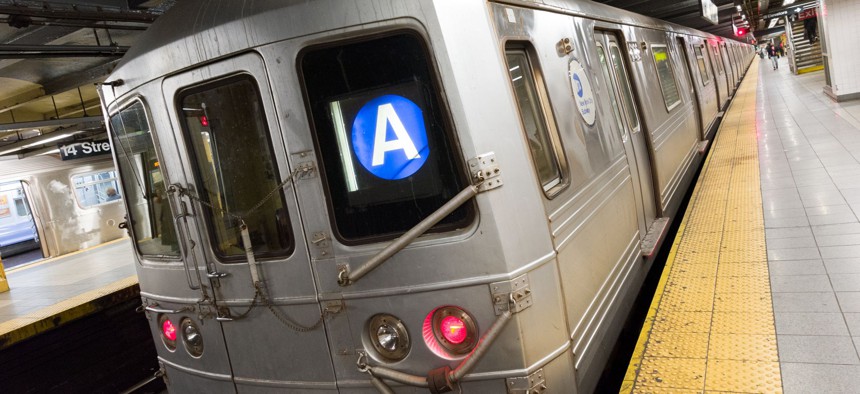Mayors to Washington: Don’t Funnel Infrastructure Funding for Cities Through States

Shutterstock

Connecting state and local government leaders
Members of the U.S. Conference of Mayors visited Capitol Hill on Thursday to discuss a range of issues, including the president’s proposed $1 trillion infrastructure package.
WASHINGTON — Looking to bypass states, U.S. mayors are pressing for direct funding to flow from the federal government to cities as part of the $1 trillion infrastructure package that President Trump has identified as a priority for his administration.
“If these dollars are sent through the states, they will not wind up addressing the infrastructure needs in America’s cities,” Oklahoma City Mayor Mick Cornett told Route Fifty on Thursday after he and about 40 other mayors met with U.S. Rep. Bill Shuster, a Pennsylvania Republican who is chairman of the House Transportation and Infrastructure Committee.
“We’re still extremely concerned about that,” Cornett added. “We’ve already made that mistake back in 2008 with the stimulus plan. We don’t want to see that repeated.”
Members of the U.S. Conference of Mayors were in Washington on Thursday to speak with congressional lawmakers and members of the Trump administration.
Cornett, a Republican, is the current president of the Conference of Mayors.
He noted Oklahoma City is responsible for about 8,000 lane-miles of road. “If you give money to the state, none of that 8,000 lane-miles of road will get addressed. They have their own inventory,” he said. “I think that disconnect is not penetrating here in Washington.”
New Orleans Mayor Mitch Landrieu, a Democrat who serves as the Conference of Mayors vice president, made a case that cities are well positioned to get projects completed.
“We build stuff every day,” he said, specifically noting the city’s reconstruction efforts after Hurricane Katrina struck in 2005. “We’ve rebuilt 33 new schools, we’re working on our water infrastructure, we’re building an airport, we have built roads.”
The mood among the mayors after the meeting with Shuster appeared generally positive.
“The fact that he is pushing for a very robust infrastructure plan, plus his strong support for tax exempt bonds, those were very powerful messages for us,” said New York City’s Democratic mayor, Bill de Blasio, referring to the federal income tax exemption for municipal bonds.
Cornett said: “He’s on our side.”
Mayors who spoke with Route Fifty after the meeting said Shuster did not offer specifics about his preferences for how a federal infrastructure package might look in terms of the balance between incentives for private financing and dollars from the federal government.
Landrieu said Shuster was “open to a lot of different options to get to the trillion-dollar mark.”
“The devil’s in the details,” Landrieu acknowledged. “How much of it is going to be public money, how much of it will be private. What’s the incentive for the private industry.”
Cornett suggested a formula akin to the one used for the U.S. Department of Housing and Urban Development’s Community Development Block Grant program could be used to distribute federal infrastructure money to cities. “It’s a different program,” he said. “But the funding formula is there, some of it goes to states, some of it goes to counties, some of it goes to cities.”
The U.S. Department of Transportation’s competitive Transportation Investment Generating Economic Recovery, or TIGER, grant program, which dates back to 2009, was another funding option Cornett voiced support for. “We don’t mind competing,” he said.
Mayor de Blasio offered the view that, “direct funding to our cities, from the federal government, results in a fast, efficient product that then has a huge, positive impact on our local economies.”
During his address to a joint session of Congress on Tuesday, Trump said he would push for infrastructure legislation that “produces a $1 trillion investment” that would be “financed through both public and private capital.”
On Thursday, visiting mayors were scheduled to meet with several other lawmakers, including Senate Majority Leader Mitch McConnell, House Appropriations Committee Chairman Rodney Frelinghuysen and House Minority Leader Nancy Pelosi.
They also had meetings planned with Education Secretary Betsy DeVos, Transportation Secretary Elaine Chao and Russ Washington, the acting director the U.S. Department of Justice Office of Community Oriented Policing Services. In the morning, mayors heard from U.S. Environmental Protection Agency administrator Scott Pruitt.
Bill Lucia is a Senior Reporter for Government Executive’s Route Fifty and is based in Washington, D.C.

NEXT STORY: Marines cut servers, improve service with hyperconverged infrastructure





